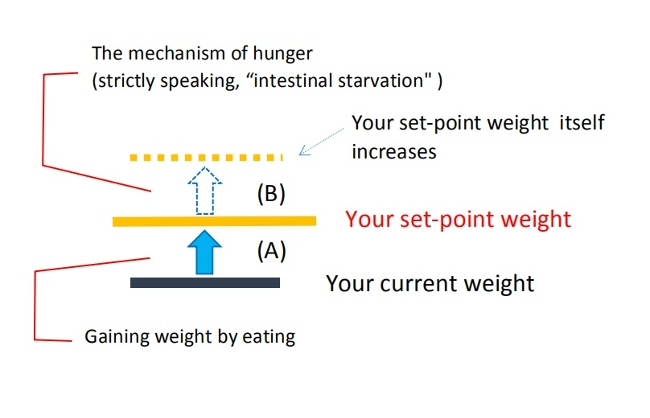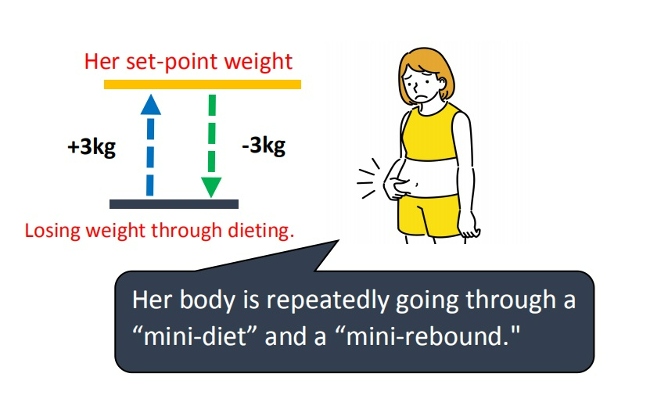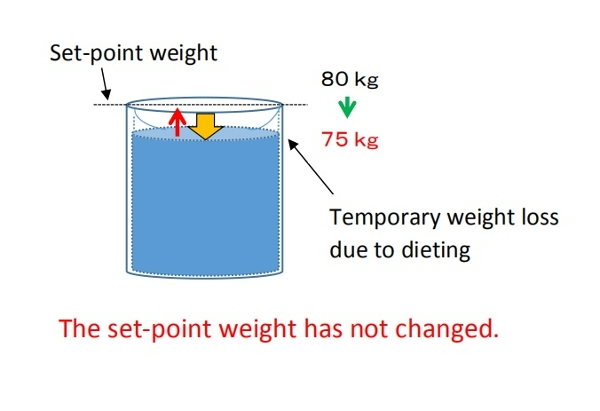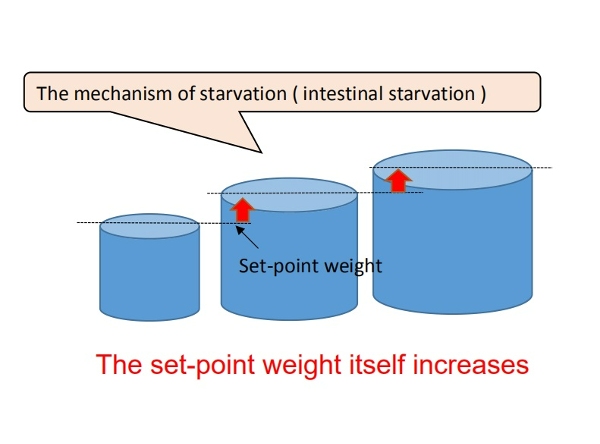Topics
03/15/2016
Two Meanings to the Phrase "Gaining Weight"
Contents
- When your weight goes back to your set-point weight (A)
- When your set-point weight itself increases (B)
Please check out my blog below before reading this one.
→ A Set-Point Weight; The Precondition Regarding the Rebound Effect
I would like to define this term first. There are two meanings of the expression "gaining weight" which we use daily. I think the confusion of these meanings causes a lot of misunderstandings.
For example, “you'll gain weight if you eat a lot of calories” or "despite dieting and eating less, you gain even more weight when you rebound,” etc.
I realized this when I got really thin, but I think the confusion of these two meanings results in various misunderstandings and false information, and most people are dieting in the wrong way.
1. When your weight goes back to your set-point weight (A)
The first one is “gaining weight” meaning to go back to your set-point weight based on the mechanism of maintaining your present condition.

Many of those who are overweight try to keep their weight low by reducing their daily caloric intake and/or doing some exercise, because they do not want to gain weight.
In such cases, the body always tries to go back to its set-point. Therefore, it is no surprise that if they stop calorie restriction and return to their previous eating habits, they will gain weight.
(Note: Temporary overeating may cause a slight increase in weight beyond the set-point, but the set-point itself remains unchanged, and the weight gain can be considered temporary.)
When people say, "If I eat high-calorie foods, I gain weight easily," or "If I eat sweets or cake, I gain weight," they are mostly talking about this meaning.

Sometimes I hear women say, "I have a body type that gains weight easily as soon as I eat a little more."
But, in my opinion, it means that the body is repeatedly going through a “mini-diet” and a “mini-rebound” by the mechanism to preserve its current stasis.
▷Toru Watanabe, a Japanese actor, used to be heavy, but with a diet, he weighed around 70kg when he appeared on a television show.
However, when he got married at twenty-six, he couldn't maintain his diet anymore and ate a lot and he went back to 130kg. (It is said that he made a new record for his weight change every time he dieted.)
Again with the help of his wife’s home cooking, he succeeded in losing 40kg.
However, in the end, he repeated rebounding. It’s quite a famous story in Japan.
(You can imagine a glass in which water is increasing and decreasing.)

2. When your set-point weight itself increases (B)
On the other hand, the second “gaining weight” expression means that your set-point weight itself increases.
Though I have reduced the amount of my food intake, I shattered my previous weight level and gained three kilograms in the last year which means I’ve gained ten kilograms in the last three years... meaning my maximum weight has increased.

This is not due to the amount of food eaten or caloric intake, but by the mechanism of hunger (strictly speaking, I have defined it as “intestinal starvation” ).
I believe that this makes a fundamental difference between fat people and thin/lean people. (You can imagine a glass of water that the glass itself is growing larger.)
[Related article]
My Definition of “Intestinal Starvation”
For example, someone who has never been more than sixty kilograms has become sixty-three kilograms in the last year. In this case, it means that his/her set-point weight itself increased from sixty to sixty-three kilograms.
When you gain weight to your set-point weight from a rebound after a diet, it's the (A) mechanism, but if you gain weight naturally more than your set-point weight, it is the (B) mechanism. This is because a calorie-restricted diet can create a situation of intestinal starvation.
It is generally believed in Japan that eating when your metabolism is slowing down makes you gain more weight, but it has already been proven that fat people have a higher basal metabolism[1].
■Japanese Sumo wrestlers are famous for eating a lot of rice and being fat, but I believe that, to put it in extreme terms, they will gain weight because of a mix of (A) and (B).
Although it looks like they eat more and are gaining weight, the mechanism should be the same as that of people who try dieting, but in the end, they gain more weight than before due to the rebound effect.
References:
[1] Dr. Jason Fung, The Obesity Code, 2016, Pages 62.

